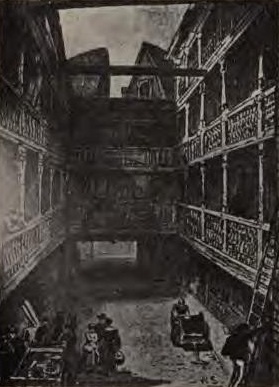| directory |
| home | contact |
|
|||||||||||||||
| search | |||||||||||||||
The Inn-YardsIn December 1574 the Common Council of London, under the influences of puritanical factions, issued a statement describing great disorder rampant in the cityby the inordinate haunting of great multitudes of people, especially youth, to plays, interludes, namely occasion of frays and quarrels, evil practices of incontinency in great inns having chambers and secret places adjoning to their open stages and galleries, inveigling and alluring of maids, especially of orphans and good citizens' children under age, to privy and unmeet contracts, the publishing of unchaste, uncomely, and unshamefast speeches and doings . . . uttering of popular, busy, and seditious matters, and many other corruptions of youth and other enormities . . . [Thus] from henceforth no play, comedy, tragedy, interlude, not public show shall be openly played or showed within the liberties of the City . . . and that no innkeeper, tavernkeeper, nor other person whatsoever within the liberties of this City shall openly show or play . . . any interlude, comedy, tragedy, matter, or show which shall not be first perused and allowed . . .Due to the London city government refusing to sanction professional acting, the building of playhouses within the city proper (within London Wall) was forbidden. Performers were, therefore, forced to receive approval by the Lord Mayor and Aldermen, and were limited to the interior yards of inns. Shakespeare's plays may have been performed in many inn-yards, including the Bell Savage inn yard, the Boar's Head, the Cross Keys, and the Bull in Bishopsgate Street. The Chamberlain's Men performed throughout the winter of 1594 at the Cross Keys, and in the summer at the Theatre in Finsbury Fields, north of London Wall. Please see The Evolution of the Elizabethan Playhouse for more information. How to cite this article: Mabillard, Amanda. "Shakespeare's Theatres: Inn Yards." Shakespeare Online. 18 Dec. 2000. (date when you accessed the information) < http://www.shakespeare-online.com/theatre/innyards.html >. ______ Related Articles |

|
©1999-2021 Shakespeare Online. All Rights Reserved.